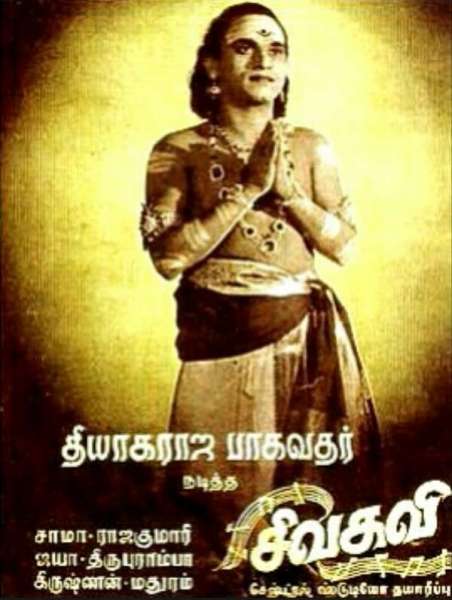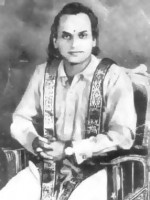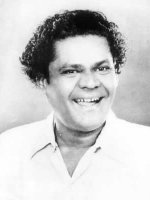Sivakavi is a film directed by Raja Sandow with M. K. Thyagaraja Bhagavathar
Sivakavi (1943)

If you like this film, let us know!
Sivakavi was a 1943 Tamil-language film directed, initially, by P. K. Raja Sandow and later, S. M. Sriramulu Naidu. It starred M. K. Thyagaraja Bhagavathar, S. Jayalakshmi, Serukulathur Sama, Thripuramba, T. R. Rajakumari, N. S. Krishnan and T. A. Madhuram. The film was shot at Central Studios and released by Pakshiraja Films in Coimbatore.
Actors

M. K. Thyagaraja Bhagavathar
(Poyyamozhi Pulavar / Ambalaththarasar)

S. Jayalakshmi
(Amrithavalli)

Thanjavur Ranganayaki Rajakumari
(Vanji)

'Kalaivanar' N. S. Krishnan
Comments
Leave comment :
Suggestions of similar film to Sivakavi
There are 57 films with the same actors, 1 films with the same director, to have finally 57 suggestions of similar films.If you liked Sivakavi, you will probably like those similar films :

Thiruneelakantar (1939)
Directed by Raja Sandow
Actors M. K. Thyagaraja Bhagavathar, 'Kalaivanar' N. S. Krishnan
Rating24%





The film was based on the life history of Thiruneelakanta Nayanar, one of the 63 Nayanmars.

Haridas (1944)
, 1h57Genres Drama, Biography
Actors M. K. Thyagaraja Bhagavathar, Thanjavur Ranganayaki Rajakumari, Nagapattinam Chandrashekhara Vasanthakokilam, 'Kalaivanar' N. S. Krishnan, Pandari Bai
Rating70%





Haridas (Thyagaraja Bhagavathar) is a vain individual who spends his life in luxury and lust ignoring his wife (Vasanthakokilam). But when his wealth is appropriated by a courtesan (T. R. Rajakumari), he realizes life's realities, reforms and spends the rest of his days serving his parents and God.

Thangapadumai (1959)
, 3h4Genres Drama
Actors Sivaji Ganesan, Padmini Ramachandran, Thanjavur Ranganayaki Rajakumari, 'Kalaivanar' N. S. Krishnan, M. N. Nambiar, M. N. Rajam
Sivaji Ganesan plays the younger physician to the king (R. Balasubramaniam) and his wife (Padmini) was modelled on Kannagi as the personification of female virtues. The physician is commanded to the palace to treat the king where the princess (M. N. Rajam) falls for him and virtually enslaves him, preventing him from going back to his wife. She even goes to the extent of blinding the hero and in a long drawn out song-oriented climax, the wife prays before the gold statue of Parvathi, hence the title, and gets back her husband's sight and happiness.

Ambikapathy (1937)
, 3h30Directed by Ellis Roderick Dungan
Actors M. K. Thyagaraja Bhagavathar, M. R. Santhanalakshmi, S. Balaiah, 'Kalaivanar' N. S. Krishnan
Rating65%





The film is based on a story set in the Chola Empire in year 1083 AD. The titular character in the story is Ambikapathy (M K. Thyagaraja Bhagavathar), the son of the Tamil poet Kambar (Serugulathur Sama) who is in love with the Chola princess and daughter of Kulothunga Chola, Amaravati (played by M. R. Santhanalakshmi). The king objects to their love and insists on testing Ambikapathy's literary mettle before judging his worth. The test given to Ambikapathi is that he should write and sing a hundred poems in the field of Puram (dealing with war and politics). The poems should not have any reference to the field of Aram (dealing of love and romance). Ambikapathi begins the test in the King's court with a Kadavul Vaazhthu(invocation to God). Amaravathi who is keeping the count, mistakes the invocation as a poem and counts it as poem number one. When he has sung only ninety nine Puram poems, she thinks he has completed the task and signals him that hundred poems have been sung. Declaring victory, Ambikapathy sings of his love for her and thus fails the test. He is executed by the king.

Manonmani (1942)
Actors Pudukkottai Ulaganathan Pillai Chinnappa, Thanjavur Ranganayaki Rajakumari, S. Balaiah, 'Kalaivanar' N. S. Krishnan
Manonmani, the Pandya princess (Rajakumari), falls in love in her dream with a prince (Chinnappa) who too does likewise with each unaware of the other's identity! But their love grows deeper in their hearts. The Rajaguru (Sama) is keen on bringing the two kingdoms together and builds a ‘secret way' from one kingdom to the other. However, the King (Perumal) is under the influence of the scheming minister Kutilan, (Balasubramaniam, the name was obviously inspired by the celebrated Kautilya, Chanakya.) The minister's son Balaiah has an eye on the princess, and the father and son try to manipulate the king's mind…

Ashok Kumar (1941)
Genres Historical
Actors M. K. Thyagaraja Bhagavathar, Chittor V. Nagaiah, Pasupuleti Kannamba, 'Kalaivanar' N. S. Krishnan, M. G. Ramachandran, Ranjan
Rating24%





The film is based on an age-old Buddhist folktale connected with Mauryan Emperor Ashoka's son Kunal. The Mauryan prince Kunal was courted by Ashoka's younger queen Tishyarakshita and when he rejected her advances, was falsely accused by the queen of trying to seduce her and was thrown into prison and blinded. The story, however, comes to a happy end with his eyesight being restored by Lord Buddha and the king acquits of all the charges.

Chandralekha (1948)
, 3h30Directed by Subramaniam Srinivasan
Genres Drama, Swashbuckler, Adventure, Historical, Musical
Themes Circus films, Films about children, Musical films, Political films, Films about royalty
Actors Ranjan, Thanjavur Ranganayaki Rajakumari, 'Kalaivanar' N. S. Krishnan, Sennalkudi Narayana Thevar Lakshmi
Rating70%





Veerasimhan (M. K. Radha) and Sasankan (Ranjan) are the sons of a king. While passing through a village on his horse, Veerasimhan meets a village dancer named Chandralekha (T. R. Rajakumari) and they fall in love. At the palace, the king decides to abdicate in favour of Veerasimhan. This enrages the younger brother Sasankan; he forms a gang of thieves who embark on a crime spree. Chandralekha's father is injured in the ensuing chaos and dies soon after. Chandralekha, now orphaned, joins a band of travelling musicians, whose caravan is raided by Sasankan's men.

Paithiyakkaran (1947)
, 3hActors 'Kalaivanar' N. S. Krishnan, M. G. Ramachandran
Paithiyakaran was based on V. Shantaram's Duniya Na Mane, which in turn was based on the Marathi novel, Na Patnari Goshta by written by Narayan Hari Apte. It was a socially themed movie which advocated for widow remarriage and against older men marrying women much younger than them.

Kannika (1947)
Actors M. R. Santhanalakshmi, 'Kalaivanar' N. S. Krishnan
The movie is about a demon whose life is imprisoned inside a pigeon. A young man destroys the demon inside the pigeon and marries the demon's daughter.

Valmiki (1946)
Genres Drama, Biography
Actors Honnappa Bhagavathar, U. R. Jeevarathinam, Thanjavur Ranganayaki Rajakumari, Nagapattinam Chandrashekhara Vasanthakokilam, S. Balaiah
The film was based on the story of the Hindu sage Valmiki (played by Honnappa Bhagavathar) who starts as a bandit and eventually undergoes spiritual transformation into a religious mendicant. Valmiki falls in love with a princess (played by Jeevarathnam) who is kidnapped by the villain (played by T. S. Balaiah).
 Connection
Connection